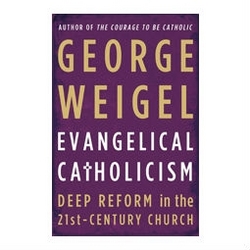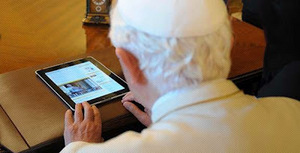You be interested in this video presentation, “Cultivating Peace in One’s Own Life and in Society” by Abbot James Wiseman of St Anselm’s Abbey (Washington, DC).
PAX!
You be interested in this video presentation, “Cultivating Peace in One’s Own Life and in Society” by Abbot James Wiseman of St Anselm’s Abbey (Washington, DC).
PAX!
The Prefect of the Congregation for the Doctrine of the Faith, Archbishop Gerhard L. Müller, addressed the Pontifical Academy of Life on 22 February 2013. It was the annual meeting in Rome. Müller’s talk didn’t shatter too many windows by unearthing new problems, nor did it break new ground in the Church’s teaching. Müller gives a brief assessment of the situation and that we have gone off the tracks in some ways. He does, however, shed light on the fact that we need to take more seriously our moral and faith formation and to put in the time doing the hard work to know the issues and how to respond to them according the parameters of the Catholic Faith. Too often we are afraid to do the hard work. And that’s the ministry of the Prefect: to illumine and offer a corrective. Archbishop Müller did challenge, to a degree, the theological professorial establishment, even if the talk may be seen a bit anemic.
The full text: Gerhard Müller Human Life in Some Documents of the Magisterium.pdf
Continue reading CDF Prefect rehearses work at hand for moral formation, dignity of the person
 In today’s mail I received my copy of George Weigel’s latest book, Evangelical Catholicism: Deep Reform in the 21-Century Church (Basic Books, 2013).
In today’s mail I received my copy of George Weigel’s latest book, Evangelical Catholicism: Deep Reform in the 21-Century Church (Basic Books, 2013).
“The internal dynamics of he Church itself, attentive tot eh promptings of the divine Bridegroom and the unique challenges posed to the Great Commission by late modernity and post-modernity, have, together, impelled a new evolution in the Church’s self-understanding and self-expression. The result of that evolution, Evangelical Catholicism, is an expression of the four enduring marks of Christian ecclesial life –unity, holiness, catholicity, and apostolicity.”
Continue reading Weigel’s Evangelical Catholicism: Deep Reform in the 21st-Century Church
Continue reading Fr Pacwa on The Eucharist for the Year of Faith
Speaking to Catholic campus ministers on January 10, 2013 in Florida, Capuchin Archbishop Charles J. Chaput addresses the urgent need to give good, authentic formation to college students in the ways of God. As he says, the status quo is not good enough. Chessy programs are not satisfying.
The frequent question is how do we evangelize and give good formation to our college students today? I think we know what needs to be done. SO, let’s get to work; let’s teach, lead and pray. Campus ministry has an objective: seek the face of God; to enable one to hear the voice of God in the still small whisper. Of course, the issues of formation are not germane only to the college aged.
An excerpt: Campus ministry needs to lead young adults not just to good religious activities that keep them busy, but also to the beauty of interior silence that enables a person to hear the will of God and entrust his or her life to Jesus Christ.
The whole text: Charles J. Chaput on Catholic Campus Ministry Association 2013.pdf
Some Year of Faith initiatives
The monks, nuns and oblates of Saint Mary’s Monastery and Saint Scholastica Priory in Petersham, MA, had a day of reflection on October 20th that covered the New Evangelization and the Benedictine charism. Dr. Philip Zaleski, an Oblate of the monastery and Father Christophe Vuillaume, OSB, a monk at Saint Mary’s gave the two presentations.
Audio files
The Year of Faith and the New Evangelization
Saint Benedict and the Life of Faith
Dr Zaleski is a professor at Smith College and a published author, and Dom Vuilaume is a priest and monk who as served at the request of the Subiaco Congregation in various locations,as of now he’s serving at Saint Mary’s.
The Monastery is celebrating 25 years of foundation this year. The monks belong to the Subiaco Congregation which is one of the largest groupings of monks and nuns in the world. Most often monasteries in the Subiaco Congregation do not engage in outside works and rely on the generosity of others. At Saint Mary’s. the Divine Office is prayed according to the traditional form of the Antiphonale Monasticum; Holy Mass is celebrated according to the Novus Ordo with the ordinary of the Mass prayed in Latin.
The nuns of Saint Scholastica Priory follow a traditional monastic life. They share the monastic church with the monks for some of the prayer times and Mass but have their own work. They were blessed recently to have two novices profess simple vows.
Hard to believe that 15 years have passed since John Paul’s post synodal exhortation Ecclesia in America. It is a remarkable document in my opinion, even though it touches on many very serious problems that we need to face from Alaska to Argentina. We hear nothing of this document these days. Every so often we hear a reference to it when a hierarch wants to say something intelligent about the situation at hand in America. Perhaps we could go back to EA with fresh eyes. What is clear is to work on ways for greater communion and solidarity with the Christians across the boarders.
We need to continue to answer the thematic of the “Encounter with the living Jesus Christ: The way to conversion, communion and solidarity in America.” We can’t set tight with only what John Paul gave us to think on, and to work on. The strength of the Church in America rests not merely on our own solution to the matters at hand but also to our persistent call to holiness.
To honor the publication’s anniversary events have been scheduled in Rome from 9-12 December. Among the presentations/dialogue we have:
Happy to see that Carl Anderson, supreme knights of the Knights of Columbus was chosen as one the presenters for today’s conference. He gives gravitas coupled with reasonableness. You may want to listen to Carl Anderson’s interview with Vatican Radio it is here.
Mr Anderson’s remarks:
As a lay
organization that has been in the United States, Canada, Mexico – and other
parts of Latin America – for more than a century, we are particularly aligned
with the vision presented in Ecclesia in America, and are working with the
Church in our hemisphere on the project of the New Evangelization.
In
re-reading Ecclesia in America 15 years after the close of the Synod for
America held here in Rome in November and December 1997, three things stand out
to me as particularly important to our discussion here and at the conference
next week.
Continue reading Ecclesia in America at 15, Carl Anderson reflects
Connecting people is a dangerous thing. It is even more perilous if you connect people from different centuries, places, ethnicities, religions and politics. I read this quote from Dr Martin Luther King, Jr (1929-1968) that made me think of those like Saint Francis Xavier had some difficulty convincing the “powers that be” that their behaviors, policies and attitudes are incoherent with the Gospel and Christ’s Church. I am thinking of Bartholomew de las Casas, OP, Blessed John Paul II, Blessed Mother Teresa of Calcutta, Blessed Franz Jägerstätter, OFS, Saint Katharine Drexel, Saint Frances Xavier Cabrini, Saint Thomas More, Venerable Servant of God Father Michael J. McGivney, Servant of God Dorothy Day, Obl SB, Father Alexander Men and countless others.
The Church must be reminded that it is not the master or the servant of the state, but rather the conscience of the state. It must be the guide and the critic of the state and never its tool. If the Church does not recapture it prophetic zeal it will become an irrelevant social club without morals or spiritual authority.
Continue reading Martin Luther King, Jr and Saint Francis Xavier with the Church
Philadelphia archbishop and Capuchin friar Charles J. Chaput writes well about the sobering reality of evangelization in his weekly column for this week. (Get in the habit of reading the Archbishop’s weekly essay.) The content of His Excellency’s essay “The new communities and the ‘New Evangelization‘” has “three simple things today: first, I’ll share some observations on the general state of the Church; second, I’ll talk about the role of new communities and charisms like the Sodalitium in the new evangelization; and third, I’ll offer some thoughts to this group as a brother in consecrated life, based on my own experience as a Capuchin and a bishop. I have a fourth point to mention as well; but it’s really more of a story. I’ll come back to it at the end of my remarks.”
Among the remarks of the archbishop’s are those he talks about the new communities, sometimes called the ecclesial communities. Each group has it’s own gift to give to the life of the Church. Each community answers a need and helps a person to be faithful to the Gospel in a new, vital way: a manner of really living the Good News and recognizing the grace of God right now.
Real Christian discipleship rejects and resists the kind of radical personal license and acquisitiveness that animates a consumerist society. So when the Catholic Church teaches about the dignity of the unborn child, the purpose of human sexuality, economic and immigration justice, the rights of religious communities and believers, and the
nature of marriage and the family – she’s not just “unpopular.” She’s hated as the enemy of individual privacy and personal freedom. And that theme shapes the way the Church is treated in the mass media.
For Catholics in my country to recover their vocation as a Church, they need to be awakened; they need a reason to be zealous again about their faith. They need to hear the witness of people like yourselves who live the Catholic faith with confidence and joy. They need to see their Church growing and fruitful, and young again, instead of constantly retreating and in decline.
This is the value of the new ecclesial communities and movements. They’re alive in Jesus Christ, and their new life and energy spill out into the whole Church.
For those of us who follow/live within the ambit of an ecclesial community whose founder is dead, what we compromise on? What will sacrifice to fit into the culture at large? Will we lose touch with the reasons that was the impulse of the founding of our community? Answer: may be; but I hope not.
Read the essay –it won’t take you long.
Our Lady, Star of the New Evangelization, pray for us.
 The Pope will tweet. Is this a mortal sin or a gospel value?
The Pope will tweet. Is this a mortal sin or a gospel value?